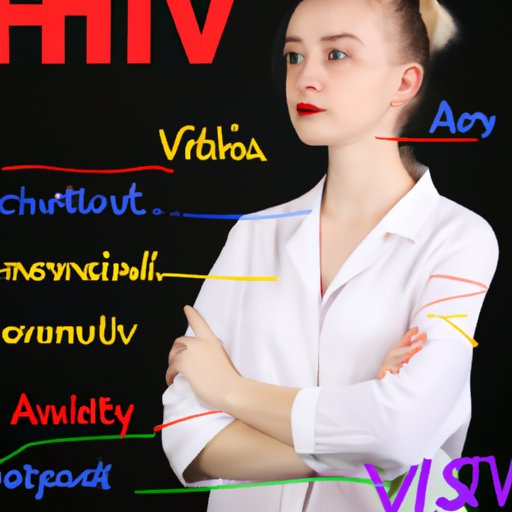
Introduction
Human Immunodeficiency Virus (HIV) is a virus that affects millions of people around the world. One of the most common concerns when it comes to HIV is whether or not it comes with symptoms. HIV is a lifelong condition that can be managed with medication, but it is essential to understand the symptoms so that treatment can begin promptly. In this article, we will explore the different facets of HIV symptoms in detail.
Overview of HIV Virus
First and foremost, let us clarify what HIV is. HIV is a virus that attacks the body’s immune system, particularly the CD4 cells, that helps fight off illnesses. When this happens, the body is no longer able to fight off infections and diseases. HIV is spread through body fluids, including blood, semen, vaginal fluids, breast milk, and anal fluids. It is essential to note that HIV is not spread through casual contact such as hugging or kissing.
When a person is infected with HIV, they may experience a variety of symptoms. These symptoms typically start to appear within two to four weeks of the initial infection and can last anywhere from a few days to several weeks. Some of the most common symptoms of HIV include:
- Fever
- Headache
- Muscle aches
- Rash
- Sore throat
- Swollen glands
- Fatigue
- Night sweats
It is important to note that not everyone experiences these symptoms, and the symptoms can differ from person to person. While approximately 80% of people experience these “flu-like” symptoms during the initial phase of the virus, others may not have any symptoms at all.
Personal Account of Living with HIV
The progression of HIV varies from person to person and is divided into three stages:
- Acute infection
- Chronic HIV infection
- AIDS
During the Acute infection stage, symptoms tend to present themselves as flu-like symptoms. During the chronic infection stage, the virus may continue to replicate in the body, and people may have few to no symptoms. During the final stage of HIV, AIDS, the body’s immune system is severely damaged, and life-threatening illnesses can arise.
Personal stories of those living with HIV can help to shed light on the nuances of the virus. For many who have been diagnosed with HIV, the initial symptoms can be an emotionally and physically exhausting experience. Those who have lived with the virus for many years may have few to no symptoms, but that does not mean that their emotional and mental health is not affected.
Comparison of HIV Symptoms to Other Illnesses or Viruses
Many illnesses and viruses share similar symptoms with HIV, which can make it challenging to diagnose. For instance, flu-like symptoms such as fever, headache, sore throat, and fatigue are common to HIV, but they can also indicate other medical conditions. Doctors may order various tests to diagnose HIV, but it can be challenging to differentiate from other diseases. For this reason, it is essential to communicate clearly with your healthcare professional about any symptoms you may be experiencing so that they can conduct the appropriate tests and treatments.
The Science Behind HIV and How it Affects the Body
The human body has a defense mechanism against different illnesses known as the immune system. This system is made up of several cells, including the CD4 cells, which help to fight off infections and diseases. When HIV enters the body, it invades CD4 cells and replicates using the machinery inside human cells. Over time, the virus kills off these immune cells, hindering the immune system’s ability to fight off infections and causing various symptoms.
The reason why some people may experience symptoms of HIV while others do not is the body’s immune system’s strength. Some people may have a robust immune system capable of fighting the virus, while others may not. It is essential to note that while some people may not experience any symptoms, they still have the virus and can spread it to others without knowing it.
Interview with a Healthcare Professional
To help us gain a broader understanding of HIV symptoms, we interviewed Dr. Thomas Black, a healthcare professional that specializes in HIV treatment and care.
Q: What are some of the most common symptoms that you see in patients with HIV?
A: The most common symptoms that I see in patients with HIV are persistent fever, fatigue, a persistent cough, and unexplained weight loss. However, it is essential to note that not everyone experiences these symptoms, and some people may have different symptoms altogether.
Emotional Toll of HIV Symptoms and Coping Strategies
The emotional toll of living with HIV can be significant, especially when symptoms are present. Symptoms like fatigue and depression can have a significant impact on a person’s daily life and can impede their ability to function normally. Coping strategies like therapy, medication, and lifestyle changes can help individuals dealing with HIV symptoms, but it is essential to talk to your healthcare professional first before making any changes.
Myth-busting Common Misconceptions
One of the most significant misconceptions surrounding HIV symptoms is that everyone who is infected will experience them. This is not accurate, and many people have no symptoms at all. Likewise, some people may experience symptoms that differ from others. HIV is a complex virus, and the symptoms are not always straightforward.
Conclusion
In conclusion, HIV is a virus that affects millions of people worldwide, and it is important to understand its symptoms. While symptoms vary from person to person, it is essential to seek medical treatment and be open about any symptoms you may be experiencing. Living with HIV can be challenging, but support and resources are available to help manage the virus and lessen its symptoms. Remember, HIV is a lifelong condition, but with proper care and management, it is possible to live a healthy and fulfilling life.




